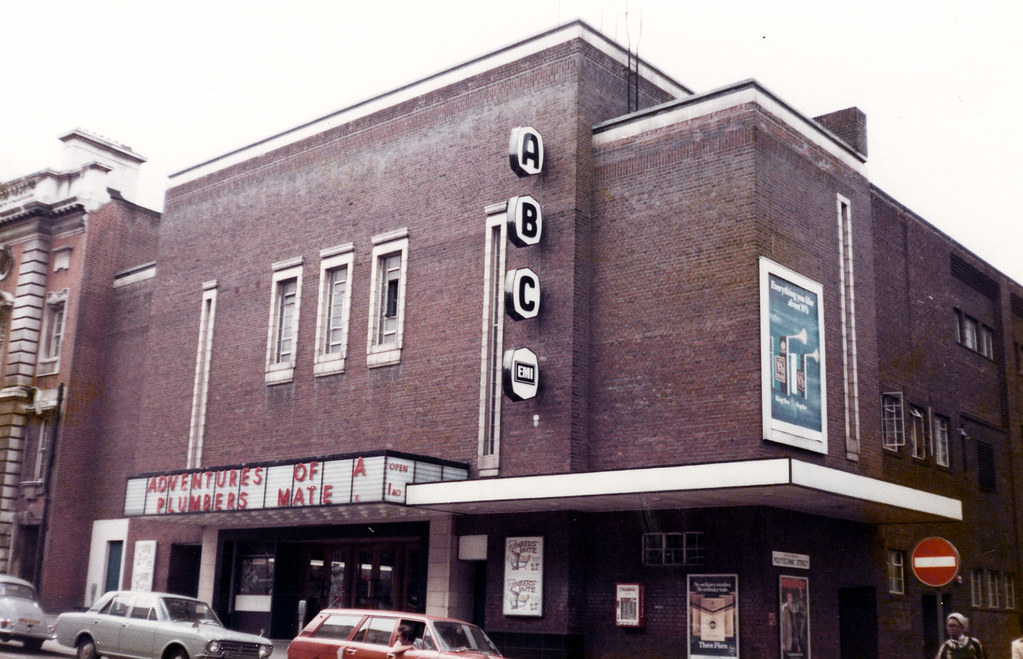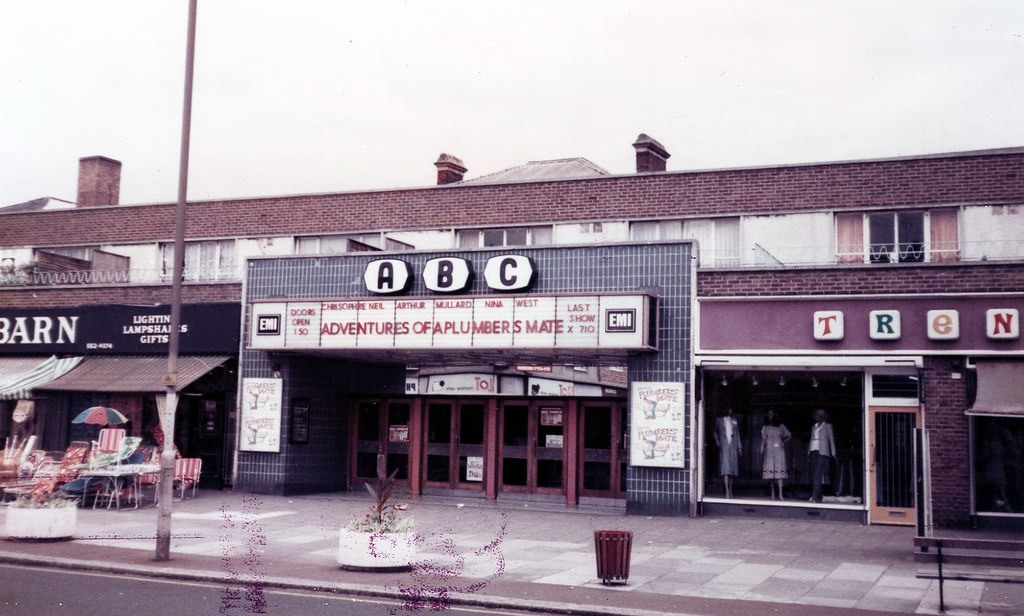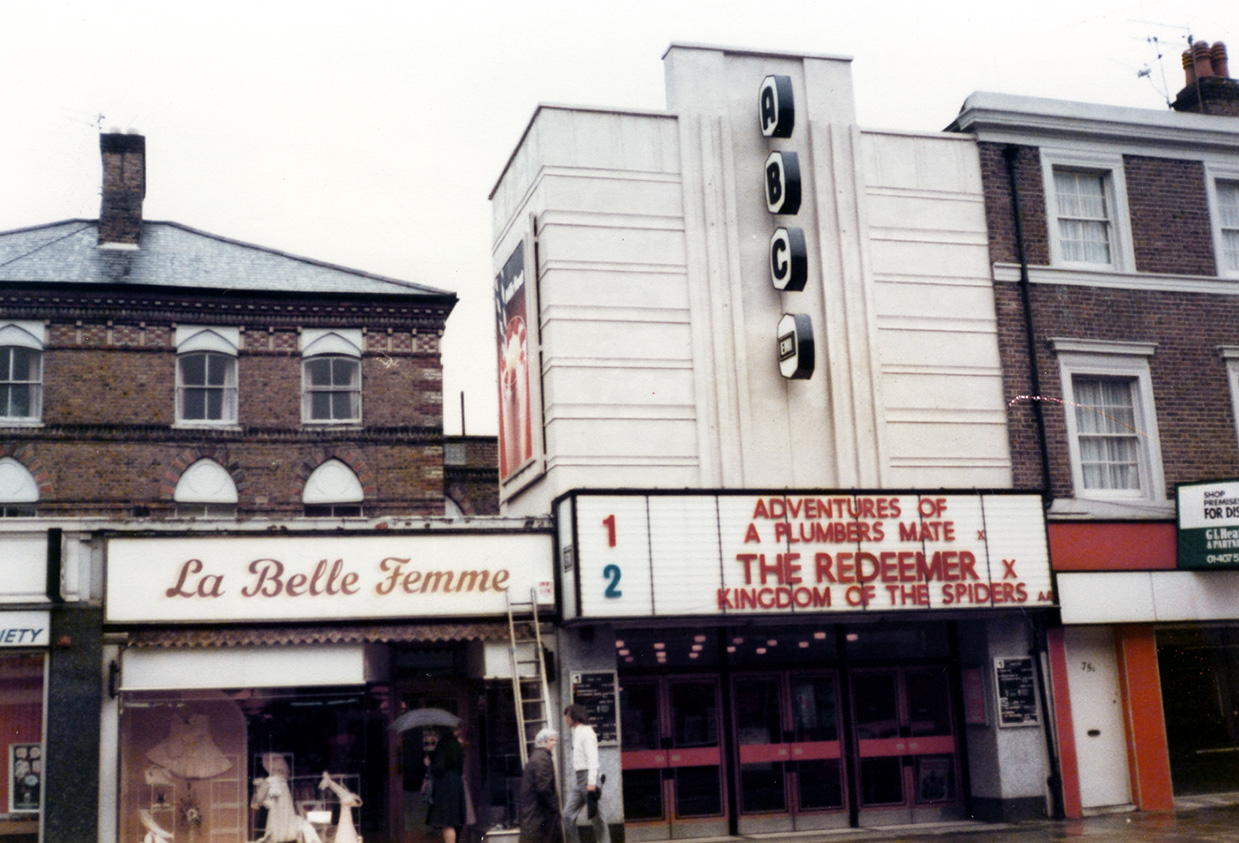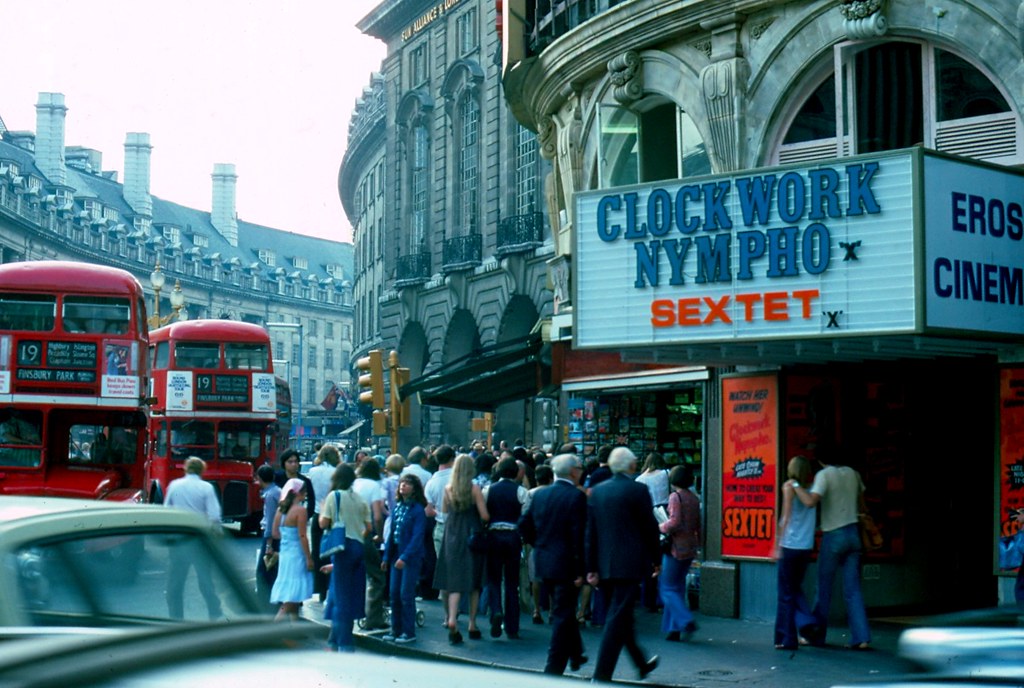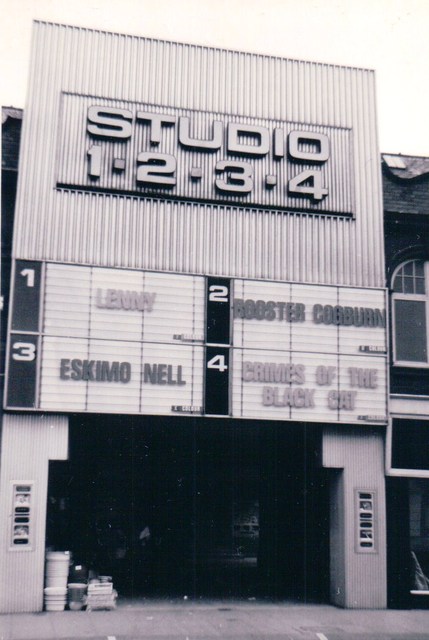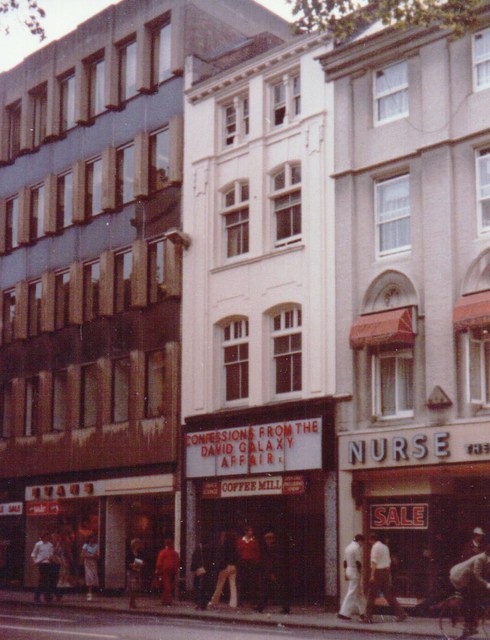
The Yes Girls often feels like Lindsay Shonteff had decided to remake his previous film ‘Permissive’, what with both films telling similar cautionary tales of young women who journey to London and enter into a cycle of being exploited and exploiting others themselves. The main difference being that whereas Permissive took place in the longhaired music scene of the early 70s, The Yes Girls focuses on more familiar territory for Shonteff, the low budget film industry of the time.
Sarcastically subtitled ‘The Story of a High Class Film’, The Yes Girls centres around Maria Carter (Sue Bond) a juvenile delinquent stuck in a boring girls school for young offenders in Sunderland. A suggestive wink and a flash of her knickers at an elderly gardener is enough to convince the randy, green-fingered old sod to help Maria escape from the school. “I’d give anything to get out of his place” she tells him, music to the ears of the oldster who agrees to leave the school gates open that night and be on hand with a change of clothes for her. Maria’s great escape doesn’t go as planned however, as while she is changing into her new clothes the gardener gets an eyeful of her breasts, the sight of which causes him to have a fatal heart attack and keel over.
Maria goes on the run anyway, only to get collared for shoplifting in a clothes shop the moment she arrives in London. The bald, menacing shop owner threatens to call the police, causing Maria to panic and pull off the clothes she had been stealing, leaving her topless and cowering in his office. The sight of her breasts doesn’t manage to kill this old geezer off, but it does convince him that a grope and a fumble about with Maria in his office would be preferable to making that phone call to the cops. Afterwards the shop owner reveals what a mean piece of work he is when he refuses to let her keep the stolen clothes, dismissing her claims that her sexual favours should count for something; “I paid for them, didn’t I” she protests.
Maria’s luck appears to improve when she hooks up with Angela (Sally Muggeridge) and Caron (Felicity Oliver), two snooty, constantly out of work actresses. The pair allow the penniless Maria to crash at their flat, an act of kindness that belies an ulterior motive, since both girls are heavily behind with their rent and their landlord Philpott (Fred Hugh) is bothering them for sex. Angela and Caron’s plan is to offer up Maria to him in exchange for not paying that month’s rent, a plan that nearly works since Maria is willing, if not exactly eager, to have sex with the repulsive, dirty mac wearing Philpott (who introduces himself to Maria with “come on luv, I’ve got real hot pants for you”) as an alternative way of paying the rent. Unfortunately Philpott is so taken by the idea of having a busty blonde at his disposal that he moves into the flat himself and kicks Angela and Caron out.
Feeling guilty at having cost Angela and Caron a roof over their heads, Maria accompanies Angela to an audition for moral support. An outing that takes them to the offices of Ritzy Film Productions, a company headed by sweary, obnoxious film producer Jack Shulton (Ray Chiarella). Shulton enters the film shouting his philosophy towards filmmaking at an underling “who the hell gives a shit about art, all we want are tits and asses, bare flesh” he rants “and if the broads are stupid, then so much the better”. Shulton’s partner in crime is King Reiter (Jack May) a miserabilist, third rate Ken Russell who dreams of directing historical epics but is always being brought down by his association with Shulton, and of course his own total lack of talent.
One look at Maria and Shulton is hankering to cast her as the lead in his latest sex film, ignoring the small matter that she isn’t even an actress. A turn of events that dismays proper thesps Angela and Caron who are only able to secure bit parts in it. Of course with a crook like Shulton at the helm, the film isn’t exactly the big budget extravaganza that he’d promised. Instead the three girls find themselves acting in a film called ‘The Flesh in the Fields’, a less than glorious experience which mainly involves them running around naked in the middle of a cow field.
Ostensibly a comedy The Yes Girls exhibits little of the zaniness of Shonteff’s Big Zapper films or the various James Bond spoofs he’d make over the years, and finds its director still clinging to the bleak, cynical world view of his previous films Night, After Night, After Night and Permissive. An outlook that fitted those two films like a glove, but needless to say works against The Yes Girls’ purpose as a comedy.
The Yes Girls is though very in keeping with the comedown mood of the early 1970s, when the optimism of the previous decade had begun to sour and counter culture lifestyles had begun to look less appealing. Angela and Caron are like female versions of the lead characters in Withnail and I, jobbing thespians destined for a life of crummy digs, forever dreaming of big acting breaks that will never come, and involving themselves in loser schemes that only succeed in getting them deeper into trouble. Maria herself is depicted as a virtually feral character, dressed in rags, hitchhiking rides and munching on sugar cubes in cafes because she doesn’t have the money for real food.
Actress Sue Bond undoubtedly had the life experiences to relate to a character like Maria, with her own humble career beginnings including stints modelling for top shelf magazines in the late Sixties (sometimes under the porn de plume ‘Heidi Kessler’) and starring in bizarre 8mm sex films like ‘Hot Teddy’ which required her to simulate sex with a giant teddy bear. At the time she appeared in The Yes Girls Sue was in the middle of a three year stint appearing on The Benny Hill Show and would go on to achieve mainstream success as a regular fixture in TV sitcoms, albeit forever typecast as comedy blondes and tart girlfriends. The Yes Girls then deserves credit for recognising Sue’s potential as leading lady material and letting her play a realistic, streetwise character for a change, one whose tough cookie persona is- by all accounts- something else Sue Bond could relate to in real life.
Not entirely the bimbo she first appears to be, Maria displays an awareness throughout the film that her body gives her a degree of power over men, especially of the wrinkly variety, and that there is no tricky situation she can’t get herself out of by flashing her boobs in a guy’s direction. Maria reacts to the death of the gardener with all the icy detachment that the heroine of Permissive did to seeing a friend expire at the end of that film. Then again the world of The Yes Girls is so black hearted that it is understandable why Maria needs to have a thick skin and be a bit mercenary minded just to get by. The only time characters aren’t being unpleasant or nasty towards Maria is when they are perving after her, or using her in some other way. A subplot about Maria hiring a private detective (Jack Smethurst) to find her long lost mother reeks of screenplay padding, but the payoff perfectly illustrates just how misanthropic this thing can get. Predictably there are no smiles or warm welcome awaiting Maria when she catches up with her mom, just a fleeting encounter with a woman who can barely be bothered to give Maria the time of day, casually tells Maria she has had five other children that she has managed to ditch along the way, and that “if I’d known you were coming, I’d have moved”.
 |
Sue Bond:
the early years
|
As with other low budget British films that write the very film industry they sprung from into their plots, from Cover Girl Killer (1959) to Cliff Twemlow’s The Ibiza Connection (1984) and Michael J Murphy’s Bloodstream (1985), The Yes Girls plays a guessing game with its audience over just how much the filmmaking shenanigans seen onscreen mirrored real life. Dialogue and characters here do have a horribly believable ring of truth to them, witness a meek scriptwriter being told his work is worthless (“you couldn’t write to your own mother” Shulman barks at him) or Angela complaining that sex film work is beneath her “I’m not used to running around naked in front of a load of men, I spent two years in drama school”.
Shonteff appears especially appalled and fixated by the Jack Shulman character, who comes across as the ultimate nightmare figure of any ethical and/or artistically inclined filmmaker. Whole scenes are dedicated to this monster bullying and yelling at others, complaining about paying for crew members’ transport and referring to actresses as ‘dogs’. Shulman is a real storm of shit that blows into, and dominates, the later half of the film. The running gag in all his scenes being that he is exploiting and bullshitting all around him, the girls promise of a trip to the south of France to shoot the film coming to nothing (“the air in Broadstairs is better” they are told), ditto his hints at a glitzy world première for the film, which actually takes place at a scuzzy sex cinema in Brighton. While in Eskimo Nell, Roy Kinnear had played a similar character as a lovable rogue, Shulman and King Reiter are simply hateful characters rather the source of any amusement. The only time The Yes Girls really pulls itself together as a comedy is the grand unveiling of ‘The Flesh in the Fields’ itself. Shot on the cheap in black and white and without sound, the film within a film turns out to be a pretentious piece of garbage involving the girls prancing about a field and beckoning to a man on horseback, complete with idiotic attempts at symbolism such as the sight of him loading his shotgun being juxtaposed with out of focus shots of Maria’s cleavage. “Black and White, it’s like watching a classic at the BFT” proclaims Angela. Maria on the other hand can’t make heads or tails of it and is patronisingly told by Caron that the reason for that is “you’re not a member of the BFT, I go there three times a week.” The digs at art-house cinema, its elitist followers and what sounds suspiciously like a thinly veiled attack on the BFI, proves that Shonteff had enough scorn here to pour over high culture as well as low. A move likely to guarantee that The Yes Girls will never be released on DVD and Blu-Ray by the BFI Flipside, as well as making The Yes Girls a hard sell to the type of film snobs who have predictably embraced Eskimo Nell and use that film as a means to look down on this genre. For The Yes Girls doesn’t let the intelligentsia off the hook when it comes to dishing out the venom.
As hell-bent as The Yes Girls is on unflatteringly portraying the Jack Shulmans and King Reiters of this world, the film does sail close to being a textbook example of Shulman’s “all we want are tits and asses, bare flesh” approach to filmmaking itself at times. The opening scene plays like a very post watershed version of one of Sue’s old Benny Hill sketches, right down to the casting of a bald, elderly man as the gardener who closely resembles regular Hill stooge Jackie Wright. Had the sight of Maria’s breasts not given him the fatal heart attack you suspect the scene that follows his death, in which Maria jogs around topless, her breasts bouncing around ten to the dozen in slow-motion, would have surely finished the old fart off. In fact the entire casting in The Yes Girls appears calculated to appeal to its target audience. Just about all of Maria’s creepy admirers in the film, the gardener, the shop owner, the landlord, the private eye, tend to fit the mental image of the type of person who’d be lured into a cinema by a film called The Yes Girls (poster tag line ‘they never said no’). No doubt many a paunchy, balding, middle aged cinemagoer could closely identify with these characters, with the film simultaneously feeding their daydreams that a Sue Bond type might one day need to throw some sex in their direction in order to pay that month’s rent or for them to turn a blind eye to a spot of shoplifting.
The Yes Girls might be a little too much of a cinematic Dr Jekyll and Mr Hyde for many, one minute heroically exposing the ugly side of the X-rated film biz, the next drooling over Sue Bond’s breasts and ungallantly obsessing over why her character never wears a bra. You’re never quite sure of where you are up to with The Yes Girls, but its many contradictions aren’t without interest. After all it is a film that gives Sue her lengthiest acting role but has her playing a woman who can’t act, it is a film that titillates but constantly reminds you of the misery and bad time experience that the film industry can be, and it is a film whose attractive lead spends a third of it dressed in baggy trousers and a tatty shirt belonging to a dead, old gardener.
As bumpy a ride as the film is, The Yes Girls was still a big hit, distributors retitled the film (junking Shonteff’s original, shooting title ‘Take Some Girls’) and it played in cinemas for over two years. A run that would see a billboard for the film- complete with giant sized photo of Sue Bond- loom over Leicester Square at one point and one sex cinema get so much play out of The Yes Girls that -according to legend- it wore out three 35mm prints of the film in the process. Sally Muggeridge’s appearance in the film also generated a fair amount of tabloid interest on account of the young actress being the real life niece of the author Malcolm Muggeridge, who just happened to be a leading figure in the vehemently anti-porn Festival of Light movement of the time. The Sunday Mirror quickly picked up on the family connection, and gave The Yes Girls some free publicity by running an ‘expose’ on her involvement in it and publishing a topless photo of her from the film. An incident which so tickled the British sex film community that it lead to Sally Muggeridge herself being parodied in Eskimo Nell, ‘Hermione Longhorn’, the character played by Katy Manning in that film, being loosely based on Sally. The Yes Girls does inadvertently make you appreciate Manning’s performance in Eskimo Nell all the more, being able to view the blueprint for her character here, reveals just how spot on Manning was in her impersonation of Muggeridge.
Ironically the aftermath of The Yes Girls’ release would have perfectly slotted into the plot of the film itself. Indeed the idea of Maria having her face plastered around Leicester Square, a sex cinema wearing out three prints of The Flesh in the Fields, and Angela turning out to be related to a famous anti-smut campaigner would have arguably made for a more satisfying conclusion to the film than the one Shonteff dreamt up. In the case of this Lindsay Shonteff film real life truly was stranger than any British sex film fiction.





